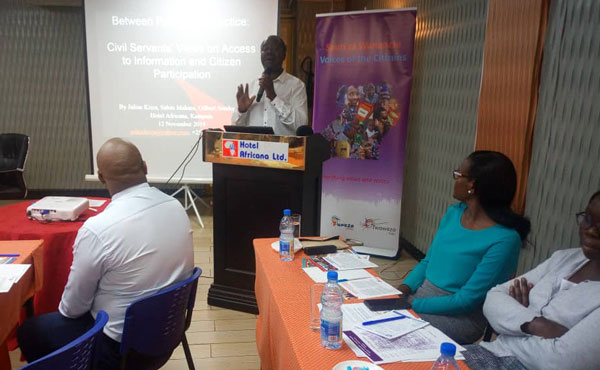
Kampala, Uganda | THE INDEPENDENT | Up to 70 percent of citizens can’t access information on local government budgets, laws and projects.
This is according to latest findings of the report generated from a qualitative research study conducted by Twaweza between December 2018 and March 2019.
The study targeted senior civil servants at national level in government ministries, Departments and Agencies, Parliament of Uganda, selected higher local governments and officers at lower local governments (sub-counties).
With 62 civil servants interviewed from national level and across five districts, the study conducted between December 2018 to March 2019 indicate that majority of public servants (both elected and appointed) have limited knowledge of the law.
The five districts selected for the study include Wakiso district in central Uganda; Buikwe on the shores of Lake Victoria; Hoima district in the Western region, Kole district in the North and Kamuli district in eastern Uganda.
“Only one public officer had a copy of access to information act. While some claimed they had seen a copy on the internet, the majority had never read it. When probed about the Regulations that operationalized the law, an overwhelming majority reported that they had never heard of the Regulations nor read them,” says Twaweza report.
Presenting findings of the brief titled; between paper and practice: Civil servants’ views on citizen participation and access to information, Makerere University’s Political Economy and Public Policy Specialist Professor Julius Kiiza said Uganda is riding on a deep-seated culture of low or no accountability due to ignorance.
Kiiza who jointly coordinated this study with Professor Sabiti Makara and the Africa Freedom of Information Centre (AFIC)’s executive director Gilbert Sendugwa argues that access to information is a matter of right and not a privilege citing that citizens have a civic duty of continuing to demand for it.
Although majority Ugandans 68% say it is either easy or very easy to meet the leaders in their area, more than half the population 63% say it is not easy to influence decision making in their sub-counties. Also 58% say it is difficult to engage with a local Civil Society Organisation.
As a result, three-quarters of the citizens say it is not easy to participate in sub-county planning and budgeting, compared to one out of five who say it is easy and one out of twenty who say it is very easy.
But Professor Kiiza insists that Ugandans unlike subjects are not like a sack of potatoes and therefore are rights holders who must hold government to account.
The report for instance established that there is weak citizen demand for information Public officials are averse to sharing information and citizens do not demand that they do.
He argues that without information, citizens lack the capacity to hold duty bearers accountable.
According to Professor Kiiza, Ugandan citizenry are predominantly peasant farmers who constitute 69% of Uganda’s 40 million people. And that they typically have limited awareness of governance spaces beyond their localities.
During the study, civil servants indicated that citizens do not demand government information. But the study attributes this view to public officials themselves not proactively making citizens aware of the mechanisms for accessing public information.
Professor Kiiza argues that the absence of rewards and sanctions for civil servants regarding the access to information leaves them in their comfort zones including the comfort zones of ignorance.
AFIC Executive Director Sendugwa contends that whereas the access to information law empowers citizens to scrutinize government decisions and hold public officials accountable, civil servants often refuse to give information.
At the time of adopting the access to information, the expectation was for this to be accompanied with citizen participation in public decision-making which, if active and sustained, would in turn build a culture of responsive government and accountable public servants, however, findings of the study reveal its impact on civil servants’ processes of disclosing information to citizens is insignificant.
The report also highlights that government has maintained a culture of secrecy where citizens respond to this posture with fear and acceptance. It further indicates that citizens quickly give up when faced with bureaucratic hurdles or unresponsive officials.
According to the report, there is direct unresolved conflict between the access to information (ATI) law and the Official Secrets Act such that public officials are left juggling between them and using their discretion to decide what to share with citizens.
Gonzaga Mayanja, the Commissioner for Monitoring and Evaluation in the Office of the Prime Minister says contradictions will be addressed to ensure citizens are better equipped and able to demand for more information.
The access to information law requires the Minister in charge of Information & National Guidance to report annually to Parliament on its implementation. However, the report observes that the minister has not complied and there is no parliamentary sanction for this lack of compliance.
******
URN
 The Independent Uganda: You get the Truth we Pay the Price
The Independent Uganda: You get the Truth we Pay the Price


